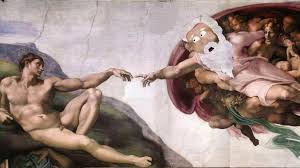Comparing the Christian and Pagan Gods

Are all Gods the same?
Throughout history, there have been various characterizations attributed to God. To completely cover each and every one of the thoughts and theories presented throughout history is beyond the score of this essay. We will however, look at two views, one of which comes from a Christian standpoint and the other from a pagan view. I know what you are thinking, there is no way that these two views could even be close to having similarities, let alone be considered the same God. In answer to this, you might be surprised, despite the differences, how similar these to views actually are when compared side by side.
For our Christian viewpoint, we will look to Aquinas’ Summa Theologica and for the pagan view; we will look at the neoplatonic views of Plotinus.
Many of us have our own views of whom or what God is, but when we attempt to explain these views they often seem vague or ambiguous. For the most part, the majority of people sees or describes God as omnipresent, potent, etc. But what does this really mean? Does God have form; is he physical, spiritual or just is? Most Christians see God as transcending all things, whereas the pagan view sees God as a part of all things. So with this being said, let us look at two well-known and influential philosophers and their descriptions of God or in the case of Plotinus “the One”.
Plotinus describes the One in this manner. “The one that made all living things, breathed life it them, made the earth, sun, moon and stars. The One is Multiple, Simple, the Definer, unseen, form and intellect/knowledge” (Baird). And if we look at Aquinas’ description of God, we see a lot of similar describing terms. Plotinus sees the One as being a part of all things, where Aquinas has God involved in but above all things. This is a common theme when comparing how Christians view God with how pagans typically view God. While descriptions may be similar, Christians have God transcending all things; with pagans see God in all things.
Both Plotinus and Aquinas talk about the soul of man and use this soul in their arguments for God. And both also hold the soul and body being separate, with one being spiritual and the other physical respectively. Also used is, the eternal, and both parties hold that God is eternal. This is, of course, somewhat hard to see with how Plotinus describes the One and the style of his writing. Aquinas’ argument is fairly easy to pull from his writing though; he uses a cause and effect type of example in support as part of his argument.
An interesting aspect that both philosophers bring to the table is that both describe God by not so much as to which attributes make up God, but rather what isn’t God. Aquinas states “negative names applied to God or signifying His relation to creatures manifestly do not signify His substance” and “ the excelling principle of whose form the effects fall short” (Baird). This use of describing what God isn’t leaves a lot of room for what God can or could be. Another thing of interest from Aquinas is this thought “Saying God is good is not saying God causes goodness, but rather what we attribute as good preexists in God” (Baird).
Plotinus compares the image of the One with intellect (knowledge or reason). This could be linked to Aquinas arguing for God’s existence being self-evident. Of note as well, is both parties refer to Socrates, Aristotle and Plato is one form or another in arguing their points. But, let us return to the image of God being compared to intellect. This is a very interesting concept, as many philosophers and theologians alike argue that God must exist as our minds tell us that something “bigger” than us must exist or how else did we come into existence ourselves. We see this argument in Plato’s thoughts on Forms as well. There must be a God or the One somewhere out there, how else did we come to know the things we instinctively know, how did we come to exist or how do we explain our logic and reason? This intellect for the philosopher is considered pure and untainted at its highest level which is attributes typically associated to God as well. And for both the philosopher as well as the religious believer, the ultimate goal is to reach a state of “perfection” for lack of a better way to simply explain the end goal. Knowledge is the thing we all seek and this is what is or comes from God and can be seen in both the argument from Plotinus and Aquinas.
In comparing the views of God (the One) of Plotinus and Aquinas, we find that they do not see things in complete agreement and are in fact describing two separate entities (by most persons opinion), but their views do hold quite a few similarities in how they view the “higher power” of the world. In comparing this view, this author is leaning more towards both philosophers are describing the same entity but using their own belief system as the basis for supporting their argument. The reader may agree with one or the other or maybe both depending on personal point of view, but if we solely look at the fact that most Christians believe that there is only one God, then it stands to reason that both the Christian and the “Pagan” are describing the same God. It should come as little surprise to anyone one with an open mind or an interest in scholarly study, that how God is viewed or described by any person who uses intellect or reason to describe God would come to similar theories. If these two philosophers are correct and there is a higher power, the One, God or whatever name one chooses to use, it does stand to reason that the descriptions should be of a similar sort as this entity would interact with all humans in the same type of manner. And if indeed all knowledge comes from or is God, then we all should have a very similar answer to the Divine type of questions.
Works Cited
Baird, Forrest E. Ancient Philosophy Volume One. Upper Saddle River: Prentice Hall, 2011,2008,2003.
Baird, Forrest E. Ancient Philosophy Volume Two. Upper Saddle River: Prentice Hall, 2011,2008,2003.









